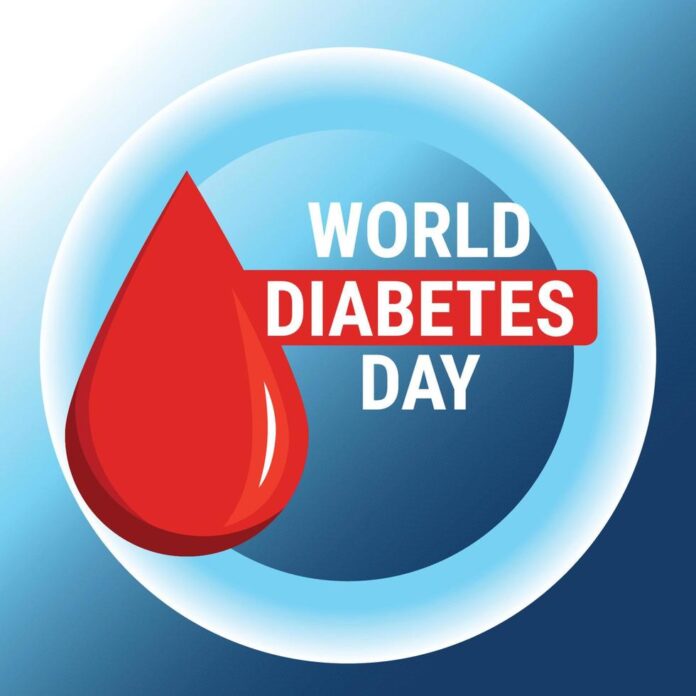- Advertisement -
ISLAMABAD, Nov 13 (APP):World Diabetes Day (WDD) will be observed globally on Thursday to raise awareness about diabetes, a chronic condition affecting millions and advocating for equitable access to comprehensive, affordable, and high-quality care for all individuals diagnosed with diabetes.
World Diabetes Day, observed on November 14 each year, has this year’s theme, “Breaking Barriers, Bridging Gaps.” It aims to promote equal access to quality care, reduce diabetes risks, and ensure comprehensive, affordable treatment for all those affected by diabetes. The day marks the world’s largest diabetes awareness campaign reaching a global audience of over 1 billion people in over 160 countries.
The theme for WDD changes annually, often emphasizing crucial aspects like diet, exercise, mental health, or healthcare accessibility for those affected by diabetes.
WDD, created in 1991 by the International Diabetes Federation (IDF) and the World Health Organization (WHO), was established in response to growing global concerns about diabetes.
In 2006, the United Nations officially recognized it as a global health threat. November 14 was chosen to honor the birthday of Sir Frederick Banting, who, alongside Charles Best, discovered insulin in 1921, transforming diabetes from a fatal disease into a manageable condition.
WDD emphasizes the importance of early diagnosis, proper care, and lifestyle changes in managing the condition. WDD also serves as a platform for health organizations and advocates to call for policy changes that ensure accessible, affordable diabetes care, especially for vulnerable communities.
As diabetes cases continue to rise, WDD’s role in educating the public about prevention and promoting healthier lifestyles has never been more crucial in tackling the diabetes epidemic.
Pakistan has over 33 million diagnosed diabetics, 11 million with impaired glucose tolerance, and 8.9 million undiagnosed cases.
There is strong evidence that an unhealthy food supply, including industrial trans fats in ghee, free sugars in sugary beverages, and bakery products, contributes to malnutrition, obesity, cardiovascular diseases, and diabetes, exacerbating the public health burden.
“We’ve developed poor dietary habits and sedentary lifestyles due to urbanization and aggressive marketing by processed food producers,” said Zubair Faisal Abbasi, advisor at the Centre for Governance and Public Accountability (CGPA).
“Additionally, our outdated food governance system and policies have left consumers, especially children and adolescents, vulnerable to unhealthy products high in sugars, fats, and salt,” added Muhammad Anwar, Executive Director of CGPA.
“There is an urgent need to reform public policies, such as taxing unhealthy foods more, regulating aggressive marketing, and implementing front-of-package warning labels,” said Zubair Faisal Abbasi. “It’s time for provincial food authorities and the Pakistan Standards and Quality Control Authority (PSQCA) to enhance their governance and take action to control and penalize producers of unhealthy foods contributing to noncommunicable diseases,” argued Muhammad Anwar.
Fayza Khan, General Secretary of the Pakistan Nutritionist and Dietician Society (PNDS), stressed the importance of a balanced diet rich in whole foods, fiber, and healthy fats, while limiting added sugars and refined carbs, for preventing and managing diabetes.
She recommended consulting a registered dietitian for a personalized nutrition plan, along with regular exercise and stress management for optimal diabetes health.
Credible research shows that many countries which have eliminated industrally produced trans fats (iTFAs) from the food supply, heavily taxed sugary sweetened beverages ( SSBs), and added Front of the Package Warning Labels (FOPWL) have controlled diabetes and other noncommunicable diseases in their countries.
There is a considerable reduction in the burden of disease. Pakistan also needs to undertake such measures on war footings otherwise not only community health status will continue to decline, but our economy will lose productivity steam, and import bill for treatments will keep increasing. It is the right time that civil society organizations such as CGPA are included in the system of food governance, and our public policies take a right route for better health financing and discourage availability, affordability, promotion, and consumption of the nutrients of public health concern.
- Advertisement -

